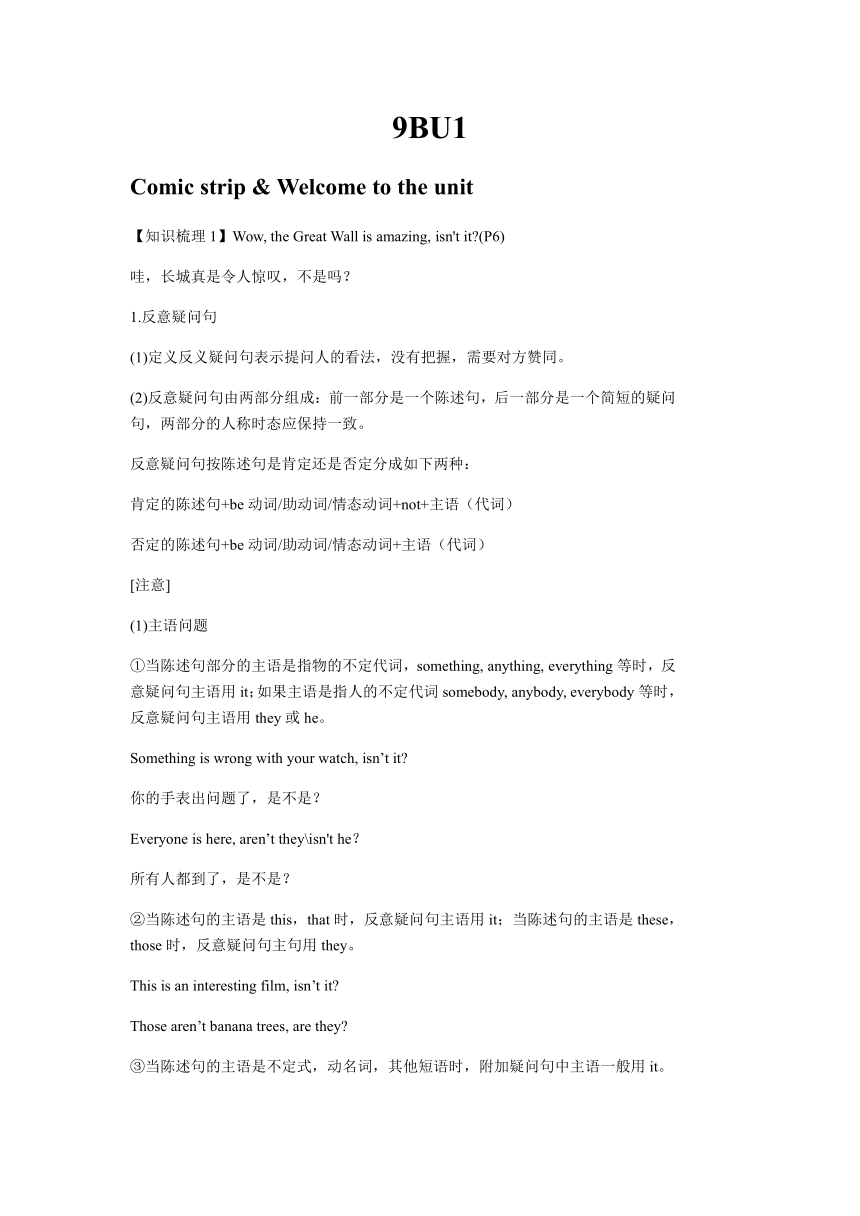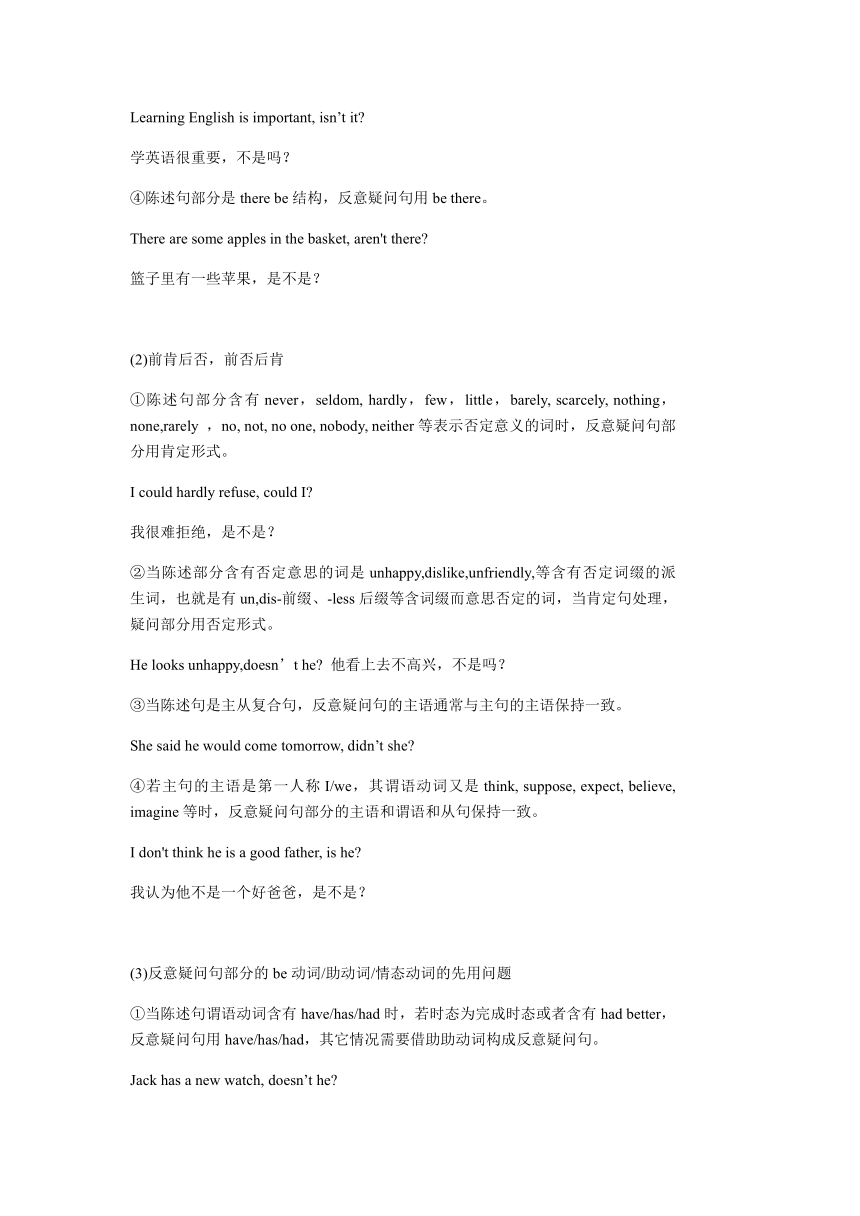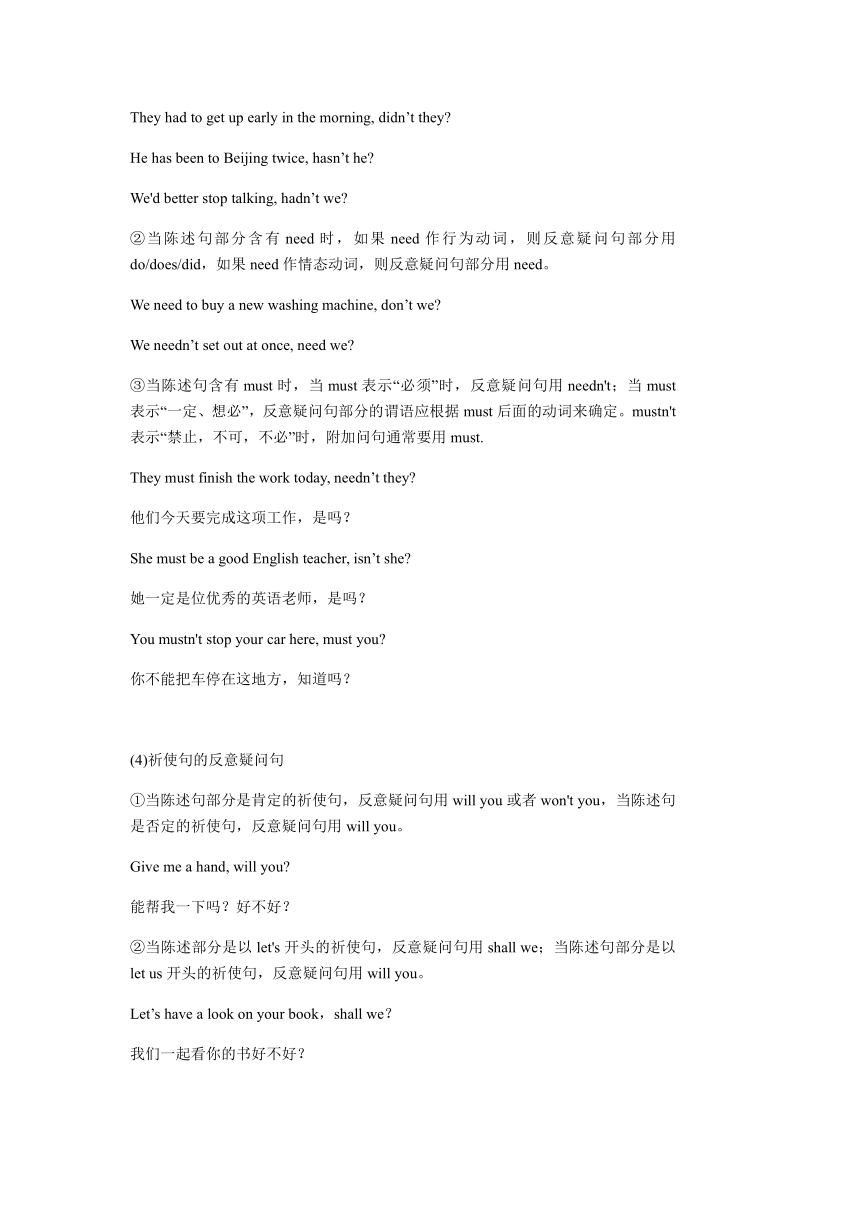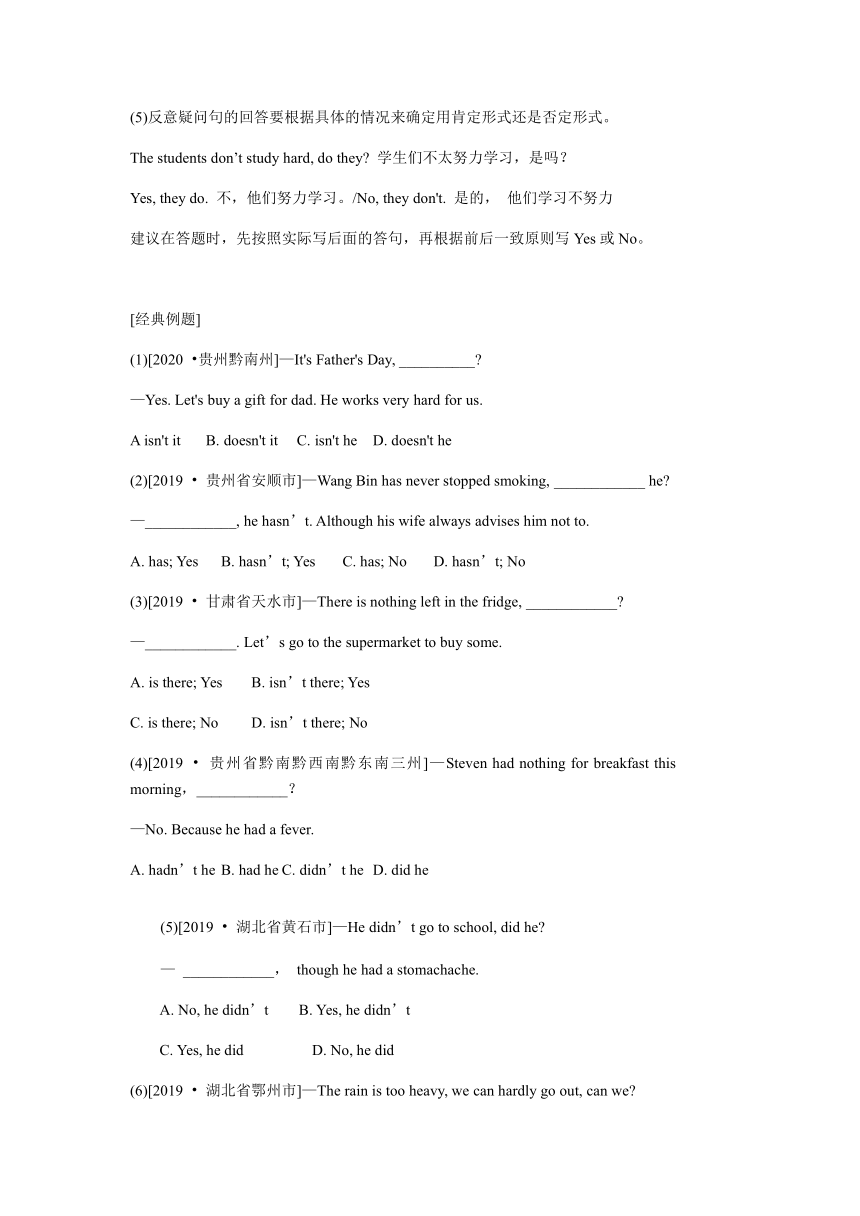牛津译林版英语九年级下册Unit 1 Asia Welcome to the unit 知识点整理及练习(含答案)
文档属性
| 名称 | 牛津译林版英语九年级下册Unit 1 Asia Welcome to the unit 知识点整理及练习(含答案) |  | |
| 格式 | docx | ||
| 文件大小 | 18.8KB | ||
| 资源类型 | 教案 | ||
| 版本资源 | 牛津译林版 | ||
| 科目 | 英语 | ||
| 更新时间 | 2021-01-27 10:45:51 | ||
图片预览




文档简介
9BU1
Comic strip & Welcome to the unit
【知识梳理1】Wow, the Great Wall is amazing, isn't it?(P6)
哇,长城真是令人惊叹,不是吗?
1.反意疑问句
(1)定义反义疑问句表示提问人的看法,没有把握,需要对方赞同。
(2)反意疑问句由两部分组成:前一部分是一个陈述句,后一部分是一个简短的疑问句,两部分的人称时态应保持一致。
反意疑问句按陈述句是肯定还是否定分成如下两种:
肯定的陈述句+be动词/助动词/情态动词+not+主语(代词)
否定的陈述句+be动词/助动词/情态动词+主语(代词)
[注意]
(1)主语问题
①当陈述句部分的主语是指物的不定代词,something, anything, everything等时,反意疑问句主语用it;如果主语是指人的不定代词somebody, anybody, everybody等时,反意疑问句主语用they或he。
Something is wrong with your watch, isn’t it?
你的手表出问题了,是不是?
Everyone is here, aren’t they\isn't he?
所有人都到了,是不是?
②当陈述句的主语是this,that时,反意疑问句主语用it;当陈述句的主语是these, those时,反意疑问句主句用they。
This is an interesting film, isn’t it?
Those aren’t banana trees, are they?
③当陈述句的主语是不定式,动名词,其他短语时,附加疑问句中主语一般用it。
Learning English is important, isn’t it?
学英语很重要,不是吗?
④陈述句部分是there be结构,反意疑问句用be there。
There are some apples in the basket, aren't there?
篮子里有一些苹果,是不是?
(2)前肯后否,前否后肯
①陈述句部分含有never,seldom, hardly,few,little,barely, scarcely, nothing,none,rarely ,no, not, no one, nobody, neither等表示否定意义的词时,反意疑问句部分用肯定形式。
I could hardly refuse, could I?
我很难拒绝,是不是?
②当陈述部分含有否定意思的词是unhappy,dislike,unfriendly,等含有否定词缀的派生词,也就是有un,dis-前缀、-less后缀等含词缀而意思否定的词,当肯定句处理,疑问部分用否定形式。
He looks unhappy,doesn’t he? 他看上去不高兴,不是吗?
③当陈述句是主从复合句,反意疑问句的主语通常与主句的主语保持一致。
She said he would come tomorrow, didn’t she?
④若主句的主语是第一人称I/we,其谓语动词又是think, suppose, expect, believe, imagine等时,反意疑问句部分的主语和谓语和从句保持一致。
I don't think he is a good father, is he?
我认为他不是一个好爸爸,是不是?
(3)反意疑问句部分的be动词/助动词/情态动词的先用问题
①当陈述句谓语动词含有have/has/had时,若时态为完成时态或者含有had better,反意疑问句用have/has/had,其它情况需要借助助动词构成反意疑问句。
Jack has a new watch, doesn’t he?
They had to get up early in the morning, didn’t they?
He has been to Beijing twice, hasn’t he?
We'd better stop talking, hadn’t we?
②当陈述句部分含有need时,如果need作行为动词,则反意疑问句部分用do/does/did,如果need作情态动词,则反意疑问句部分用need。
We need to buy a new washing machine, don’t we?
We needn’t set out at once, need we?
③当陈述句含有must时,当must表示“必须”时,反意疑问句用needn't;当must表示“一定、想必”,反意疑问句部分的谓语应根据must后面的动词来确定。mustn't表示“禁止,不可,不必”时,附加问句通常要用must.
They must finish the work today, needn’t they?
他们今天要完成这项工作,是吗?
She must be a good English teacher, isn’t she?
她一定是位优秀的英语老师,是吗?
You mustn't stop your car here, must you?
你不能把车停在这地方,知道吗?
(4)祈使句的反意疑问句
①当陈述句部分是肯定的祈使句,反意疑问句用will you或者won't you,当陈述句是否定的祈使句,反意疑问句用will you。
Give me a hand, will you?
能帮我一下吗?好不好?
②当陈述部分是以let's开头的祈使句,反意疑问句用shall we;当陈述句部分是以let us开头的祈使句,反意疑问句用will you。
Let’s have a look on your book,shall we?
我们一起看你的书好不好?
(5)反意疑问句的回答要根据具体的情况来确定用肯定形式还是否定形式。
The students don’t study hard, do they? 学生们不太努力学习,是吗?
Yes, they do. 不,他们努力学习。/No, they don't. 是的, 他们学习不努力
建议在答题时,先按照实际写后面的答句,再根据前后一致原则写Yes或No。
[经典例题]
(1)[2020 ?贵州黔南州]—It's Father's Day, __________?
—Yes. Let's buy a gift for dad. He works very hard for us.
A isn't it B. doesn't it C. isn't he D. doesn't he
(2)[2019 ? 贵州省安顺市]—Wang Bin has never stopped smoking, ____________ he?
—____________, he hasn’t. Although his wife always advises him not to.
A. has; Yes B. hasn’t; Yes C. has; No D. hasn’t; No
(3)[2019 ? 甘肃省天水市]—There is nothing left in the fridge, ____________?
—____________. Let’s go to the supermarket to buy some.
A. is there; Yes B. isn’t there; Yes
C. is there; No D. isn’t there; No
(4)[2019 ? 贵州省黔南黔西南黔东南三州]—Steven had nothing for breakfast this morning,____________?
—No. Because he had a fever.
A. hadn’t he B. had he C. didn’t he D. did he
(5)[2019 ? 湖北省黄石市]—He didn’t go to school, did he?
— ____________, though he had a stomachache.
A. No, he didn’t B. Yes, he didn’t
C. Yes, he did D. No, he did
(6)[2019 ? 湖北省鄂州市]—The rain is too heavy, we can hardly go out, can we?
—____________, or we'll get wet and have a cold.
A. No, we can’t B. Yes, we can’t C. Yes, we can D. No, we can
(7) When I arrived home, my father was cooking,__________?
A. wasn’t he B. wasn’t she C. didn’t he D. didn’t she
答案:ACCDC AA
2.amazing,形容词,意为“令人惊讶的”。常用来修饰物。
The most amazing thing about nature is its infinite variety.
大自然最让人惊叹的地方在于它的无限多样性。
[拓展]amazed,形容词,意为“(某人)感到惊奇的”。常用来修饰人。be amazed by/at 意为“对……感到惊奇”。
We were amazed by the play's success.
我们惊叹该剧的成功。
[巩固练习]
It will be an _________ time, but what made me even ____ was to find that nobody was hurt. (amaze)
答案:amazing; more amazed
[经典例题]
(1)---Oh, what _________ news!
---Yes, all of us were _________ at it.
A.amazing; amazing
B.amazed; amazed
C.amazing; amazed
D.amazed; amazing
答案:C
【知识梳理2】It's tiring to climb the steps and my feet hurt. (P6)
爬台阶太累了,我的脚疼。
1.tiring是形容词,意为“使人疲劳的;累人的”。一般用来修饰事物。
It had been a long tiring day.
这一天让人感到又累又长。
[拓展]tired是形容词,意为“感到疲劳的”。主语一般是表示人的名词或代词。
I'm too tired even to think.
我累得连想也不愿意想。
[经典例题]
(1)After many ________days, each of us hoped for some rain.
A. dry B. busy C. free D. tiring
(2)The work was so _________ that everyone felt very _________.
A. tiring, tiring B. tired, tired C. tiring, tired D. tired, tiring
(3)This is _______ movie I've ever seen. It's a waste of time!
A. a more tiring B. a more tired C. the most tiring D. the most tired
答案:ACC
2.step,名词,意为“台阶;梯级;步骤”。
She moved a step closer to me.
她朝我靠近一步。
[拓展]
step by step 逐步地
take steps 采取措施
watch your step 小心行事
step down 辞职
【知识梳理3】We'd better keep moving. (P6)我们最好继续前进。
1.had better意为“最好”,常用来表示对别人的建议、劝告或表达一种愿望。
had better后接动词原形,其否定式为had better not do sth.,意为“最好不要做某事”。had better可与前面的代词缩写为’d better。
You had better drive slowly and carefully.
你最好开慢点,小心点。
[经典例题]
(1)-- You look worried. You'd better_________ your problem with others.
-- Oh, yes. _________a problem is like cutting it in half.
A. share; Sharing B. sharing; To share
C. to share; To share D. share; Shared
(2)To keep you________, you had better__________helmets when you skate on real ice.
A. safe, to wear B. safe, put on
C. safely, wear D. safely, put on
(3)It’s getting dark . You’d better_________out alone . It’s dangerous
A. not go B. not to go C. to go D. don’t go
答案:ABA
2.keep doing sth.意为“继续做某事,一直做某事”,相当于 keep on doing sth.。
She forced herself to keep going.
她强迫自己坚持下去。
【知识梳理4】Tian’anmen Square, the Palace Museum and the Great Wall are wonderful places to go.(P7)
天安门广场,故宫博物馆以及长城都是很好的去处。
to go在这里是动词不定式作定语,修饰wonderful places。
(1)位置:放在所修饰的名词、代词之后。
(2)动词不定式与所修饰的词之间往往有动宾关系,如果该不定式是不及物动词,或者该不定式本身有宾语,后面应有必要的介词。
Tom is not alone in finding Rick hard to work with.
并不只是汤姆一人认为和里克难以共事。
Comic strip & Welcome to the unit
【知识梳理1】Wow, the Great Wall is amazing, isn't it?(P6)
哇,长城真是令人惊叹,不是吗?
1.反意疑问句
(1)定义反义疑问句表示提问人的看法,没有把握,需要对方赞同。
(2)反意疑问句由两部分组成:前一部分是一个陈述句,后一部分是一个简短的疑问句,两部分的人称时态应保持一致。
反意疑问句按陈述句是肯定还是否定分成如下两种:
肯定的陈述句+be动词/助动词/情态动词+not+主语(代词)
否定的陈述句+be动词/助动词/情态动词+主语(代词)
[注意]
(1)主语问题
①当陈述句部分的主语是指物的不定代词,something, anything, everything等时,反意疑问句主语用it;如果主语是指人的不定代词somebody, anybody, everybody等时,反意疑问句主语用they或he。
Something is wrong with your watch, isn’t it?
你的手表出问题了,是不是?
Everyone is here, aren’t they\isn't he?
所有人都到了,是不是?
②当陈述句的主语是this,that时,反意疑问句主语用it;当陈述句的主语是these, those时,反意疑问句主句用they。
This is an interesting film, isn’t it?
Those aren’t banana trees, are they?
③当陈述句的主语是不定式,动名词,其他短语时,附加疑问句中主语一般用it。
Learning English is important, isn’t it?
学英语很重要,不是吗?
④陈述句部分是there be结构,反意疑问句用be there。
There are some apples in the basket, aren't there?
篮子里有一些苹果,是不是?
(2)前肯后否,前否后肯
①陈述句部分含有never,seldom, hardly,few,little,barely, scarcely, nothing,none,rarely ,no, not, no one, nobody, neither等表示否定意义的词时,反意疑问句部分用肯定形式。
I could hardly refuse, could I?
我很难拒绝,是不是?
②当陈述部分含有否定意思的词是unhappy,dislike,unfriendly,等含有否定词缀的派生词,也就是有un,dis-前缀、-less后缀等含词缀而意思否定的词,当肯定句处理,疑问部分用否定形式。
He looks unhappy,doesn’t he? 他看上去不高兴,不是吗?
③当陈述句是主从复合句,反意疑问句的主语通常与主句的主语保持一致。
She said he would come tomorrow, didn’t she?
④若主句的主语是第一人称I/we,其谓语动词又是think, suppose, expect, believe, imagine等时,反意疑问句部分的主语和谓语和从句保持一致。
I don't think he is a good father, is he?
我认为他不是一个好爸爸,是不是?
(3)反意疑问句部分的be动词/助动词/情态动词的先用问题
①当陈述句谓语动词含有have/has/had时,若时态为完成时态或者含有had better,反意疑问句用have/has/had,其它情况需要借助助动词构成反意疑问句。
Jack has a new watch, doesn’t he?
They had to get up early in the morning, didn’t they?
He has been to Beijing twice, hasn’t he?
We'd better stop talking, hadn’t we?
②当陈述句部分含有need时,如果need作行为动词,则反意疑问句部分用do/does/did,如果need作情态动词,则反意疑问句部分用need。
We need to buy a new washing machine, don’t we?
We needn’t set out at once, need we?
③当陈述句含有must时,当must表示“必须”时,反意疑问句用needn't;当must表示“一定、想必”,反意疑问句部分的谓语应根据must后面的动词来确定。mustn't表示“禁止,不可,不必”时,附加问句通常要用must.
They must finish the work today, needn’t they?
他们今天要完成这项工作,是吗?
She must be a good English teacher, isn’t she?
她一定是位优秀的英语老师,是吗?
You mustn't stop your car here, must you?
你不能把车停在这地方,知道吗?
(4)祈使句的反意疑问句
①当陈述句部分是肯定的祈使句,反意疑问句用will you或者won't you,当陈述句是否定的祈使句,反意疑问句用will you。
Give me a hand, will you?
能帮我一下吗?好不好?
②当陈述部分是以let's开头的祈使句,反意疑问句用shall we;当陈述句部分是以let us开头的祈使句,反意疑问句用will you。
Let’s have a look on your book,shall we?
我们一起看你的书好不好?
(5)反意疑问句的回答要根据具体的情况来确定用肯定形式还是否定形式。
The students don’t study hard, do they? 学生们不太努力学习,是吗?
Yes, they do. 不,他们努力学习。/No, they don't. 是的, 他们学习不努力
建议在答题时,先按照实际写后面的答句,再根据前后一致原则写Yes或No。
[经典例题]
(1)[2020 ?贵州黔南州]—It's Father's Day, __________?
—Yes. Let's buy a gift for dad. He works very hard for us.
A isn't it B. doesn't it C. isn't he D. doesn't he
(2)[2019 ? 贵州省安顺市]—Wang Bin has never stopped smoking, ____________ he?
—____________, he hasn’t. Although his wife always advises him not to.
A. has; Yes B. hasn’t; Yes C. has; No D. hasn’t; No
(3)[2019 ? 甘肃省天水市]—There is nothing left in the fridge, ____________?
—____________. Let’s go to the supermarket to buy some.
A. is there; Yes B. isn’t there; Yes
C. is there; No D. isn’t there; No
(4)[2019 ? 贵州省黔南黔西南黔东南三州]—Steven had nothing for breakfast this morning,____________?
—No. Because he had a fever.
A. hadn’t he B. had he C. didn’t he D. did he
(5)[2019 ? 湖北省黄石市]—He didn’t go to school, did he?
— ____________, though he had a stomachache.
A. No, he didn’t B. Yes, he didn’t
C. Yes, he did D. No, he did
(6)[2019 ? 湖北省鄂州市]—The rain is too heavy, we can hardly go out, can we?
—____________, or we'll get wet and have a cold.
A. No, we can’t B. Yes, we can’t C. Yes, we can D. No, we can
(7) When I arrived home, my father was cooking,__________?
A. wasn’t he B. wasn’t she C. didn’t he D. didn’t she
答案:ACCDC AA
2.amazing,形容词,意为“令人惊讶的”。常用来修饰物。
The most amazing thing about nature is its infinite variety.
大自然最让人惊叹的地方在于它的无限多样性。
[拓展]amazed,形容词,意为“(某人)感到惊奇的”。常用来修饰人。be amazed by/at 意为“对……感到惊奇”。
We were amazed by the play's success.
我们惊叹该剧的成功。
[巩固练习]
It will be an _________ time, but what made me even ____ was to find that nobody was hurt. (amaze)
答案:amazing; more amazed
[经典例题]
(1)---Oh, what _________ news!
---Yes, all of us were _________ at it.
A.amazing; amazing
B.amazed; amazed
C.amazing; amazed
D.amazed; amazing
答案:C
【知识梳理2】It's tiring to climb the steps and my feet hurt. (P6)
爬台阶太累了,我的脚疼。
1.tiring是形容词,意为“使人疲劳的;累人的”。一般用来修饰事物。
It had been a long tiring day.
这一天让人感到又累又长。
[拓展]tired是形容词,意为“感到疲劳的”。主语一般是表示人的名词或代词。
I'm too tired even to think.
我累得连想也不愿意想。
[经典例题]
(1)After many ________days, each of us hoped for some rain.
A. dry B. busy C. free D. tiring
(2)The work was so _________ that everyone felt very _________.
A. tiring, tiring B. tired, tired C. tiring, tired D. tired, tiring
(3)This is _______ movie I've ever seen. It's a waste of time!
A. a more tiring B. a more tired C. the most tiring D. the most tired
答案:ACC
2.step,名词,意为“台阶;梯级;步骤”。
She moved a step closer to me.
她朝我靠近一步。
[拓展]
step by step 逐步地
take steps 采取措施
watch your step 小心行事
step down 辞职
【知识梳理3】We'd better keep moving. (P6)我们最好继续前进。
1.had better意为“最好”,常用来表示对别人的建议、劝告或表达一种愿望。
had better后接动词原形,其否定式为had better not do sth.,意为“最好不要做某事”。had better可与前面的代词缩写为’d better。
You had better drive slowly and carefully.
你最好开慢点,小心点。
[经典例题]
(1)-- You look worried. You'd better_________ your problem with others.
-- Oh, yes. _________a problem is like cutting it in half.
A. share; Sharing B. sharing; To share
C. to share; To share D. share; Shared
(2)To keep you________, you had better__________helmets when you skate on real ice.
A. safe, to wear B. safe, put on
C. safely, wear D. safely, put on
(3)It’s getting dark . You’d better_________out alone . It’s dangerous
A. not go B. not to go C. to go D. don’t go
答案:ABA
2.keep doing sth.意为“继续做某事,一直做某事”,相当于 keep on doing sth.。
She forced herself to keep going.
她强迫自己坚持下去。
【知识梳理4】Tian’anmen Square, the Palace Museum and the Great Wall are wonderful places to go.(P7)
天安门广场,故宫博物馆以及长城都是很好的去处。
to go在这里是动词不定式作定语,修饰wonderful places。
(1)位置:放在所修饰的名词、代词之后。
(2)动词不定式与所修饰的词之间往往有动宾关系,如果该不定式是不及物动词,或者该不定式本身有宾语,后面应有必要的介词。
Tom is not alone in finding Rick hard to work with.
并不只是汤姆一人认为和里克难以共事。
